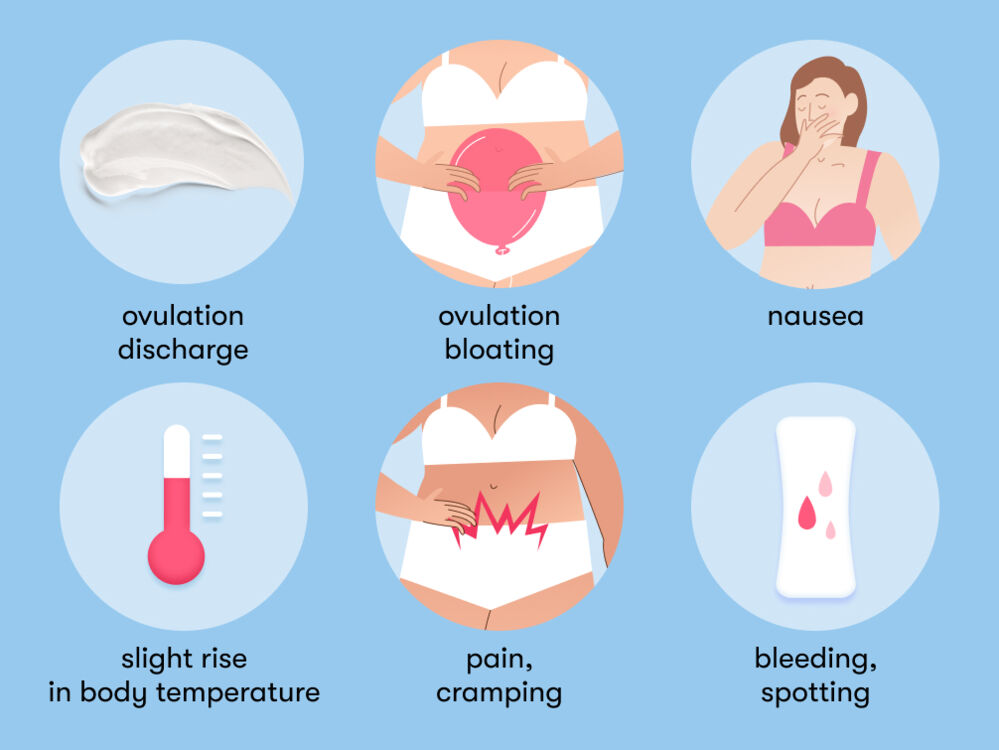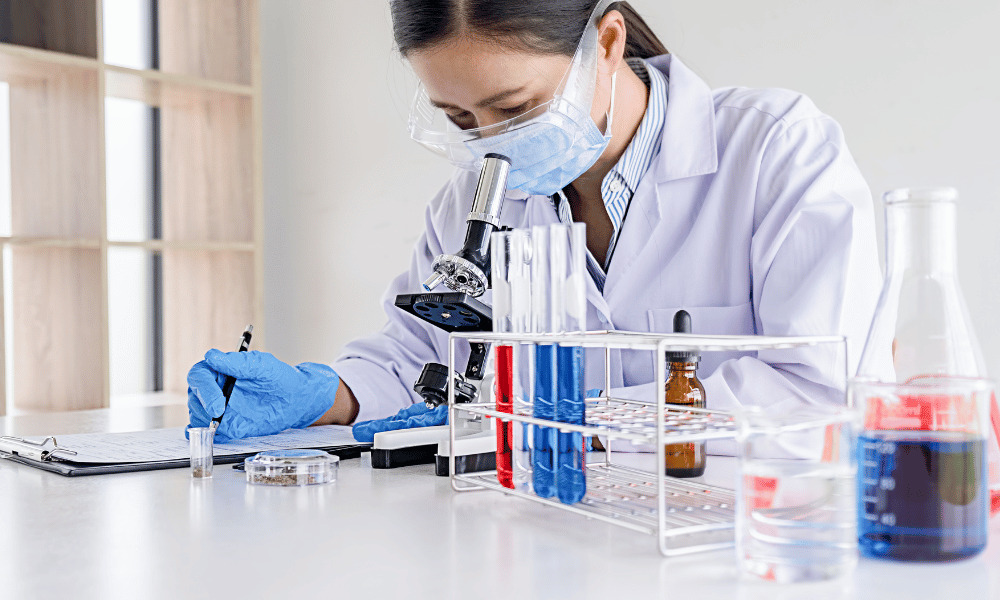
Can Ovulation Cause Fatigue? Are you tired of feeling exhausted during ovulation? You’re not alone! Many women wonder if ovulation is the culprit behind their fatigue, and we’re here to shed light on this issue. While some sources suggest that ovulation can actually boost energy levels due to higher estrogen levels others argue that ovulation itself doesn’t make you feel sleepy. Nevertheless, fatigue during ovulation is a common concern for many women. In this blog post, we’ll delve into the factors that might contribute to fatigue during ovulation and provide practical tips to manage this tiredness. So, if you’re tired of feeling tired, keep reading to discover how to reclaim your energy during ovulation!
Understanding the Female Menstrual Cycle

The menstrual cycle is a series of natural changes in hormone production and the structures of the uterus and ovaries in the female reproductive system. It is responsible for preparing the body for pregnancy. The cycle is divided into different stages, which I will explain below:
- Menstrual Phase (also known as the menstruation phase): This is the first stage of the menstrual cycle. It begins when an egg from the previous cycle is not fertilized. The lining of the uterus, which has thickened to support a potential pregnancy, is shed through the vagina in the form of menstrual bleeding. This phase typically lasts around 3 to 7 days [2][3][6].
- Follicular Phase: The follicular phase starts on the first day of menstruation and lasts until ovulation. During this phase, the pituitary gland in the brain releases follicle-stimulating hormone (FSH), which stimulates the development of follicles in the ovaries. Each follicle contains an immature egg. As the follicles grow, they release estrogen, which thickens the lining of the uterus [2][3][6].
- Ovulation Phase: Ovulation usually occurs around the middle of the menstrual cycle, typically on day 14 in a 28-day cycle. During ovulation, the mature follicle releases an egg from the ovary. The egg travels through the fallopian tube towards the uterus, where it can potentially be fertilized by sperm. This phase is influenced by luteinizing hormone (LH) released by the pituitary gland. Ovulation is considered the most fertile period of the menstrual cycle [2][3][6].
- Luteal Phase: The luteal phase begins after ovulation and lasts until the start of the next menstrual cycle. After the egg is released, the follicle transforms into a structure called the corpus luteum, which produces progesterone. Progesterone helps prepare the uterus for potential pregnancy by further thickening the uterine lining. If fertilization and implantation of a fertilized egg do not occur, the corpus luteum breaks down, hormone levels drop, and the menstrual cycle begins again [2][3][6].
Ovulation: A Complex Biological Process
Ovulation is a crucial event in the menstrual cycle, playing a significant role in fertility and pregnancy. It refers to the release of a mature egg from the ovary, making it available for fertilization by sperm. This process occurs approximately in the middle of a woman’s menstrual cycle, typically about two weeks before her expected period [2]. The release of the egg is triggered by a surge of luteinizing hormone (LH) [3].
Hormones, such as follicle-stimulating hormone (FSH), estrogen, and progesterone, play a crucial role in regulating ovulation. At the beginning of the menstrual cycle, FSH stimulates the growth of follicles in the ovary, which contain the eggs. As the follicles develop, they produce estrogen, which causes the uterine lining to thicken in preparation for a possible pregnancy [1]. When estrogen levels reach a certain threshold, it triggers a surge in LH, leading to the release of a mature egg from the dominant follicle. This egg then enters the fallopian tube, where it can potentially be fertilized by sperm [2].
The timing and duration of ovulation can vary among women and even from month to month within an individual. On average, ovulation lasts for about one day, but the fertile window, when a woman is most likely to conceive, extends beyond that. Sperm can survive inside a woman’s body for up to five days, and the egg remains viable for around 12 to 24 hours after ovulation. Therefore, the fertile period encompasses the days leading up to and including the day of ovulation [5].
Understanding ovulation and its timing is crucial for those trying to achieve or prevent pregnancy. Tracking menstrual cycles and recognizing ovulation symptoms can help individuals plan for or avoid conception. Various methods, including ovulation predictor kits and tracking basal body temperature, can assist in identifying the fertile window and optimizing the chances of pregnancy [5].
What are the symptoms of ovulation?

The symptoms of ovulation can vary from woman to woman, but there are some common physical and emotional signs to look out for. One physical symptom associated with ovulation is increased cervical mucus. This mucus becomes thin, clear, and stretchy, resembling raw egg whites, which helps facilitate sperm movement [2]. Another physical symptom is mittelschmerz, which refers to mild pelvic pain or twinges that some women experience during ovulation [2]. Additionally, breast tenderness is a common symptom, where the breasts may feel sore or swollen due to hormonal changes [2]. Bloating or water retention can also occur during ovulation, causing discomfort and a feeling of fullness in the abdomen [2].
In terms of emotional and psychological symptoms, mood swings are often reported during ovulation. Hormonal fluctuations can lead to changes in mood, ranging from irritability and anxiety to feelings of happiness and well-being [3]. Fatigue and lethargy are also mentioned as potential symptoms of ovulation. However, it’s important to note that ovulation is typically associated with higher energy levels due to increased estrogen levels [1]. While fatigue can occur, it is not a universal symptom and may be influenced by individual factors [1].
Understanding Fatigue

Fatigue, defined as an overwhelming lack of energy or an increased need for effort during daily activities, can have a significant impact on daily life. It is a common symptom experienced by individuals across various conditions and stages of life [1]. Several factors influence fatigue levels, including hormonal fluctuations, sleep disturbances, nutritional deficiencies, and stress and emotional well-being.
Hormonal fluctuations can contribute to fatigue, particularly in conditions like menopause. The physical and emotional symptoms associated with menopause, such as hot flashes, mood changes, and sleep problems, can disrupt sleep and lower energy levels [3]. Similarly, in Parkinson’s disease, fatigue is a common non-motor symptom that can occur early in the disease and persist throughout its progression [2].
Sleep disturbances, including insomnia or disrupted sleep patterns, can lead to fatigue. Lack of quality sleep can result in reduced energy levels, difficulty concentrating, and overall feelings of tiredness [1]. Additionally, nutritional deficiencies can play a role in fatigue. Inadequate intake of essential nutrients, such as iron, vitamin D, and B vitamins, can contribute to low energy levels and fatigue [10].
Stress and emotional well-being have a profound impact on fatigue. Chronic stress, anxiety, and depression can drain energy reserves, leading to persistent fatigue [6]. The incessant demands of caregiving for individuals with chronic diseases can also result in fatigue among caregivers, affecting both their own well-being and the quality of care they provide [7]. Furthermore, stress-related fatigue can be interconnected with other factors such as sleep disturbances and hormonal imbalances, creating a cycle of fatigue and exacerbating its impact on daily life.
Can Ovulation Cause Fatigue|why am i so tired during ovulation?

Does ovulation make you tired? Is fatigue a symptom of ovulation? The answer is yes, it can be. When women ovulate, their bodies go through significant changes which can often leave them feeling tired and worn out. The interplay between ovulation and fatigue involves various factors such as hormonal changes, sleep disruptions, and increased physical activity. Let’s delve into each aspect in detail:
Hormonal Changes
During ovulation, the levels of estrogen and progesterone, two primary hormones involved in the menstrual cycle, fluctuate significantly [1]. Estrogen levels rise, peaking just before ovulation, while progesterone levels increase after ovulation [1]. These hormonal fluctuations can impact energy levels and contribute to fatigue.
It is possible to get exhausted during ovulation. Your body may appear exhausted as it prepares for ovulation, then releases the egg. The statement is partly true. Hormonal exhaustion is caused by sudden drops in estrogen after ovulation.
Your energy levels are affected by Fluctuation of Both the estrogen and progesterone.
Both hormones are at their lowest at the beginning of menstrual cycle. The reason why you may feel sluggish at the beginning of your period and in the follicular phase you will feel better because your estrogen levels slowly rise during this phase.
Your estrogen levels are at peak when you reach ovulation. The reason why fatigue isn’t related to ovulation usually you are feeling good at this stage. Dr. Lakeisha Richardson M.D. OB/GYN tells Romper. “No, ovulation does not make you sleepy,” The majority of scientific research and evidence surrounds insomnia in your premenstrual period, which begins just after ovulation.
In the luteal stage, progesterone levels rise and the level of oestrogen drops. This “depressive” progesterone effect can leave you tired or depressed. If you are experiencing ovulation-related fatigue, you should check the length of the cycle. You might actually be in the luteal stage
Sleep Disturbances
Ovulation can potentially disrupt sleep patterns, leading to fatigue. Some women may experience difficulties falling asleep or staying asleep during this phase of the menstrual cycle [3]. Hormonal changes, particularly an increase in progesterone after ovulation, can affect sleep quality [3]. Sleep disruptions can contribute to feeling tiredness during ovulation and exhaustion during ovulation.
In one study, researchers discovered that women who are fertile sleep less than usual at night. The researchers found a link between reduced sleep and high energy levels throughout the day.
Your progesterone is rising during the luteal phase and your cortisol and melatonin levels will be dropping. These hormones are all involved in the sleep-wake cycles and may contribute to fatigue. Cortisol, on the other hand, is responsible for keeping us awake. Melatonin induces sleep but cortisol keeps you up. Drops in these two hormones may lead to additional fatigue, and an inability to fall asleep.
According to researchers, the effectiveness of melatonin during the luteal period decreases due to the interaction between melatonin and your sexual hormones. Board-certified OB/GYN, Dr. Sherry Ross, explains that estrogen, a hormone associated with a positive, energetic feeling, drops right before the ovulation. This can lead to fatigue. Sherry ROSS, MD, told Romper. You may also be experiencing additional restlessness because your internal temperature is slightly higher.
In a second research, women with late reproductive ages and low estrogen levels showed poorer sleep. Low estrogen levels were found in women with sleep apnea and other sleep disorders, including premenopausal or menopausal sleep disorders. According to the study, estrogen supplementation may be able to improve sleep.
After ovulation you may experience insomnia due to the change in progesterone. Progesterone can cause your body temperature to increase during this phase, which will affect sleep. You can predict your fertile state by using the basal temperature of your body.
According to the Sleep Foundation, high levels of progesterone cause a reduction in REM sleeping. The quality of rest is provided by this stage.
Some women may experience an increase in physical activity or a higher motivation to engage in exercise during ovulation. This surge in energy and physical drive is believed to be associated with the rise in estrogen levels [4]. Increased physical activity can lead to temporary fatigue due to the exertion on the body. It is important to balance physical activity with adequate rest and recovery.
Managing Fatigue During Ovulation

Managing fatigue during ovulation involves implementing lifestyle modifications, prioritizing sleep hygiene, adopting a balanced diet, managing stress levels, utilizing strategies to boost energy, engaging in regular exercise and physical activity, considering natural energy-boosting remedies, and practicing mindfulness and relaxation techniques. Here’s a comprehensive explanation of each aspect:
- Lifestyle modifications for managing fatigue: Making certain adjustments in your lifestyle can help combat fatigue during ovulation. These modifications may include maintaining a consistent sleep schedule, avoiding excessive caffeine and alcohol consumption, minimizing exposure to electronic devices before bedtime, and creating a relaxing bedtime routine [8].
- Prioritizing sleep hygiene: Paying attention to sleep hygiene practices can significantly impact your energy levels. Ensure that you have a comfortable sleep environment, maintain a cool and dark bedroom, establish a regular sleep schedule, and limit daytime napping to promote better sleep quality [8].
- Adopting a balanced diet: A nutritious diet plays a vital role in managing fatigue. Include a variety of whole foods in your meals, emphasizing fruits, vegetables, whole grains, lean proteins, and healthy fats. Avoid excessive consumption of processed foods, sugary snacks, and drinks, as they can lead to energy crashes. Stay adequately hydrated by drinking enough water throughout the day [8].
- Managing stress levels: Stress can contribute to fatigue, so it’s essential to find effective stress management techniques. This may involve practicing relaxation techniques like deep breathing exercises, meditation, or yoga. Engaging in activities you enjoy, such as hobbies, reading, or spending time in nature, can also help reduce stress levels [9].
- Strategies for boosting energy levels: Implement strategies to boost your energy during the day. This can include breaking tasks into smaller, manageable chunks, taking short breaks, engaging in physical movement or stretching, listening to energizing music, or socializing with supportive individuals [7].
- Regular exercise and physical activity: Engaging in regular exercise can improve overall energy levels and combat fatigue. Aim for at least 150 minutes of moderate-intensity aerobic activity per week, along with strength training exercises. Consult with a healthcare professional before starting any new exercise regimen [7].
- Natural energy-boosting remedies: Some natural remedies may help boost energy levels, although scientific evidence may vary. These include consuming adaptogenic herbs like ginseng or rhodiola, drinking green tea, using essential oils like peppermint or rosemary for aromatherapy, or taking supplements like iron or vitamin B12 if deficiencies are present [7].
- Mindfulness and relaxation techniques: Incorporating mindfulness and relaxation practices into your daily routine can help manage fatigue. Techniques such as deep breathing exercises, progressive muscle relaxation, guided imagery, or mindfulness meditation can promote relaxation, reduce stress, and improve overall well-being [8].
When to Seek Medical Advice

When facing fatigue during ovulation, it is important to understand when to seek medical advice. While occasional fatigue during ovulation is considered normal, there are certain circumstances in which it is advisable to consult a healthcare professional. Here are some factors to consider:
- When fatigue becomes chronic or severe: If you consistently experience extreme fatigue around ovulation that persists beyond your ovulation period and interferes with your daily activities, it may indicate an underlying issue that requires medical attention. Chronic or severe fatigue could be a sign of anemia, hormonal imbalances, thyroid disorders, or other health conditions [1].
- Possible underlying health conditions: Fatigue during ovulation can be influenced by various factors, including hormonal changes, but it’s essential to rule out any underlying health conditions. Conditions such as polycystic ovary syndrome (PCOS), endometriosis, or reproductive disorders can contribute to fatigue [3].
- The importance of consulting a healthcare professional: Consulting a healthcare professional is crucial to receive an accurate diagnosis and appropriate treatment. They can evaluate your symptoms, conduct relevant tests if necessary, and provide personalized advice based on your specific situation. Seeking medical advice ensures that any potential underlying health conditions are identified and addressed appropriately [8].
Conclusion
Fatigue during ovulation is a common occurrence for many women. The hormonal changes and physical adjustments that take place during this phase of the menstrual cycle can contribute to feelings of tiredness. Understanding the relationship between ovulation and fatigue can help women manage their energy levels better and make necessary lifestyle adjustments to reduce fatigue. fatigue during ovulation is a valid concern for many women. By understanding the hormonal changes, lifestyle factors, and coping mechanisms, women can navigate this phase of their menstrual cycle with greater ease. If you experience persistent or severe fatigue, it is always recommended to consult a healthcare professional for a comprehensive evaluation and appropriate guidance.
YOU MAY ALSO LIKE:
Does nexplanon help with ovarian cysts | FERTILITY FORTUNE
what is ovarian vein embolization? | FERTILITY FORTUNE
Best Low ovarian reserve diet | FERTILITY FORTUNE
Can ovarian cyst cause infertility? | FERTILITY FORTUNE
Can ovarian cysts cause abnormal pap smears?
